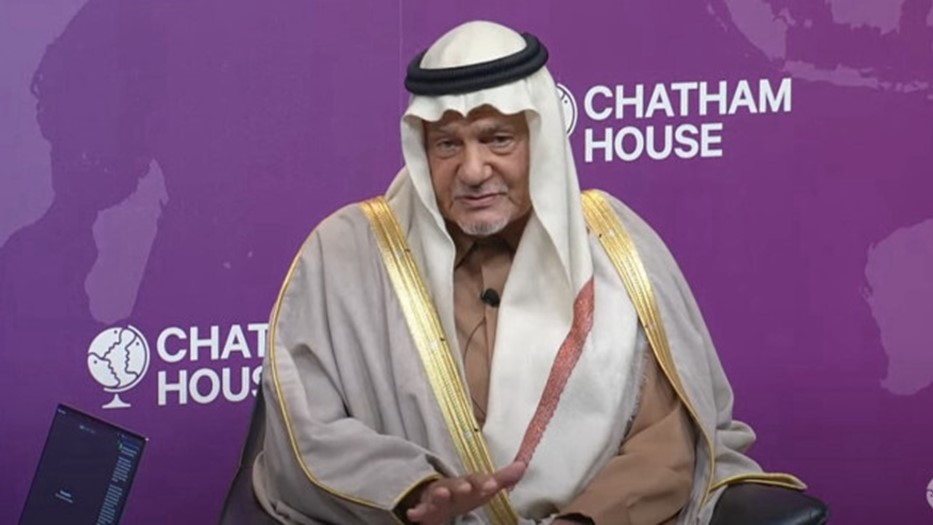Normalization of relations between Saudi Arabia and Israel will not be possible until an independent Palestinian state is established, Saudi statesman, politician, diplomat and prince from the Saudi royal dynasty Turki bin Faisal Al Saud has warned.

The gist of the Saudi prince’s speech
The prince claimed, without offering any evidence, that the US is interested in restarting talks between Israel and Saudi Arabia to strengthen regional security and economic ties. But it should be added that the US is not so much interested in strengthening regional security as in regaining its former high level of influence in the Middle East, which it lost because of its unbridled support for Israel. Nevertheless, as a member of the ruling House of Saud, Turki al-Faisal affirmed that “if there’s a Palestinian state that Israel accepts to come (into) existence, then we can talk about normalization with Israel.”
The Prince added: “Before October 7… talks not only progressed along those lines, but also the Kingdom invited a Palestinian delegation to come and talk directly to the Americans about what it is that might bring about a Palestinian state… I’m not privy to those talks, so I don’t know what happened between the Palestinians and the Americans, but the Kingdom’s position has always been we won’t speak for the Palestinians. They have to do it for themselves. Unfortunately, of course, October 7 (the Hamas attack on Israel) put an end to those talks.”
Prince Turki Al-Faisal said the establishment of a Palestinian state is crucial not only to Israel’s ties with Saudi Arabia but also with the rest of the Muslim world. In his opinion, which, incidentally, reflects the viewpoint of Saudi heir apparent Crown Prince Mohammed bin Salman Al Saud on this issue, a Palestinian state is a primary condition for the normalization of relations between Saudi Arabia and Israel, but “on the Israeli side the whole government is saying no Palestinian state.” He reiterated that for Saudi Arabia, an independent Palestine would mean one with the 1967 borders, including East Jerusalem.
It may be recalled that the Kingdom has led several efforts to achieve a peaceful solution to the conflict, specifically King Fahd’s 1981 Peace Plan and the 2002 Arab Peace Initiative proposed by King Abdullah. During the current bloodbath in Gaza, the Kingdom is leading the Muslim world through high-level meetings with representatives of the Arab states and other Muslim countries, and the Saudi Foreign Minister has led various diplomatic missions to convince the rest of the world to stop the fighting.
Fair criticism of the US
Significantly, the prince criticized the US and other Western countries for not putting more pressure on Israel to end the war, noting that Britain had only recently begun suspending some licenses for arms exports to Israel after the election of its new government in July. “I’d like to see more done by the UK,” he said. “I think, for example, the UK… should recognize the State of Palestine. It’s long overdue.”
Prince Turki said the US can apply direct pressure on Israeli Prime Minister Benjamin Netanyahu over the actions of his government and Armed Forces, and should address funding and lobbying by groups and individuals sympathetic to the state of Israel. “I think the US has enormous tools to affect Israel which it isn’t using, not just simply… denial of supply of weapons and material to the Israelis. A lot of financial help goes to Israel from the US. If some of the privileges that the Israeli lobby, for example, in America, enjoys — of tax-free contributions to Israel — can be withdrawn from those Israeli lobbyists, that will put great pressure on Israel.”
In the US, he continued, you have to register as a lobbyist for a particular country or face prosecution if you want to speak on behalf of that country, but many organizations in America do this for Israel and still enjoy tax-exempt status because they are not considered representing Israel as such, but simply philanthropic or humanitarian groups, even though the individuals representing them have two citizenships. The prince was highly skeptical of a change in US policy toward Israel: “There are many tools that are available to the US, not simply harsh talk, which seems to have gotten us nowhere. But is America ready to do that? As I said, I’m not too optimistic about that.”
That, in short, is the essence of what the Saudi prince said, and he is well aware of the mechanism of US domestic and foreign policy, having spent several years as Saudi ambassador to the US. Many politicians have written quite directly that all it would take is one phone call from Joe Biden to Tel Aviv to end the Palestinian bloodbath, but that he will not do this during what remains of his presidential term. This is why Netanyahu behaves so brazenly, flouting all international laws and rules of war, and constantly threatening the neighboring Arab countries. Moreover, Israel is constantly shelling Syria, Lebanon and Yemen, and it is mostly civilians that are being killed as a result of these strikes. And such barbarism will continue in the future, for both Israel and the US live in their own unipolar world, and see a big stick as the only way to settle any dispute. Nevertheless, the majority of peoples and countries in the world are increasingly beginning to see the perniciousness of the US policy, which prevents the creation of a new multipolar world based on respect for the national interests of all peoples. And the example of Saudi Arabia, once a staunch ally of the West, is clear evidence of this.
Victor Mikhin, corresponding member of RANS, exclusively for the online magazine “New Eastern Outlook”
